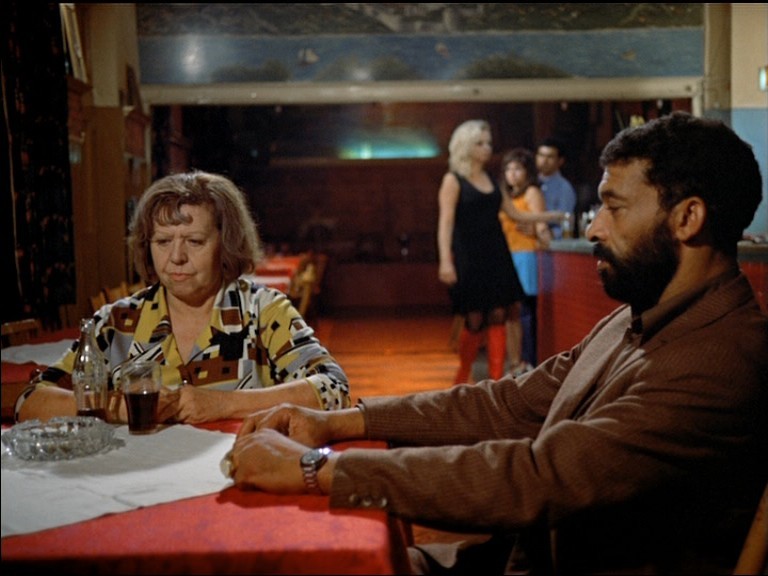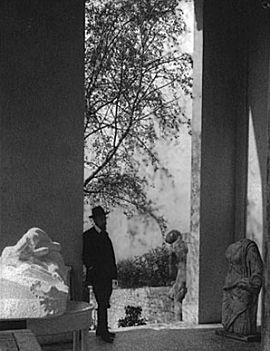A special day requires a special topic, and again I turn to a reluctant masterpiece.
 In the beginning we see a rainy puddle on a dark city street; the only sound apart from the rain is music from Arab North Africa, music that to the untrained ear seems plaintive, mournful, and bone-chilling. It will take another scene to show us we are in Germany and a couple more to indicate we are in this city. Out of the rain comes Emmi Kurowski (Brigitte Mira), a sixtyish charwoman, who enters an estaminet where everyone seems to know each other but not her. "I walk by every night and hear foreign music," she says with the curiosity typical of old people trying to recall happy memories, "in what language are they singing?" "Arabic," says the bar owner, a tall, buxom blonde with odd bags beneath her eyes. Emmi then asks what the usual drink is in this bar, as if she had forgotten how to order a drink and didn't want to offend the regulars by imposing her will upon them. She gets a cola and the attention of the few people near the bar. Two tall, swarthy, handsome fellows in their mid- to late thirties, one clean-shaven, the other with a full beard, are clearly not Germans, whereas the territorial behavior of the two women frolicking beside them suggests they have never left Munich. On a dare, the bearded man approaches Emmi and asks her to dance. They dance, talk, immediately recognize their mutual solitude in a world not designed for them, and then walk to Emmi's place together. Later that same night, after the man has missed the last streetcar home, they begin a love affair.
In the beginning we see a rainy puddle on a dark city street; the only sound apart from the rain is music from Arab North Africa, music that to the untrained ear seems plaintive, mournful, and bone-chilling. It will take another scene to show us we are in Germany and a couple more to indicate we are in this city. Out of the rain comes Emmi Kurowski (Brigitte Mira), a sixtyish charwoman, who enters an estaminet where everyone seems to know each other but not her. "I walk by every night and hear foreign music," she says with the curiosity typical of old people trying to recall happy memories, "in what language are they singing?" "Arabic," says the bar owner, a tall, buxom blonde with odd bags beneath her eyes. Emmi then asks what the usual drink is in this bar, as if she had forgotten how to order a drink and didn't want to offend the regulars by imposing her will upon them. She gets a cola and the attention of the few people near the bar. Two tall, swarthy, handsome fellows in their mid- to late thirties, one clean-shaven, the other with a full beard, are clearly not Germans, whereas the territorial behavior of the two women frolicking beside them suggests they have never left Munich. On a dare, the bearded man approaches Emmi and asks her to dance. They dance, talk, immediately recognize their mutual solitude in a world not designed for them, and then walk to Emmi's place together. Later that same night, after the man has missed the last streetcar home, they begin a love affair.
The man's name, on and off-screen, is El Hedi Ben Salem M'Barek Mohammed Mustafa, and his homeland in both realities is Morocco. He was a boxer before moving to Germany and becoming involved with this director, his strapping muscles displayed in many scenes throughout the film. On-screen, however, he is an auto mechanic who left his small village two years ago to seek a better life abroad ("Morocco is beautiful," he explains, "but there are no jobs"). His German is clearly pronounced although his verbs remain unconjugated and his nouns undeclined; even his name is far too unwieldy for Germans, so he is dubbed "Ali," or how many Middle Eastern guest workers (mostly, as it were, Turks) were referred to in postwar Europe. He accepts this moniker because he is not the same person as he once was at home. "Ali" has evolved into a perfect metaphor for the thankless work he performs every day for relatively low wages, as well as the lumping categorization that he and his fellow Muslims endure. The setup for their relationship is abetted by the fact that Emmi's deceased husband was also a foreigner, a Pole by the name of Franciszek, with whom she had three ingrate children before he died twenty years before (as she leads Ali upstairs for the first time, two nosy and appalled neighbors mention her "foreigner" and then concur that "she's not even a real German with that last name Kurowski"). In a way Ali reminds her of the pleasant strangeness that comes with talking to a total outsider, one who has not taken all of Germany's luxuries for granted, one who "always finds her coffee good," one who is thankful for friends, intimacy, and the flotsam of human kindness bobbing about the sea of man. Ali does not do much with his time ("always working, always drinking, not good"), and is therefore not averse to moving out of an apartment he shares with "five Arab colleagues" and starting a meaningful life with someone who appreciates him. They get married without telling a soul, then lunch at a restaurant in which Hitler "used to eat all the time." "Do you know who Hitler was?" she asked during their first evening together, as if warning Ali that the land he has chosen as his home has a history of intolerance. There is something quietly defiant in Emmi's bringing him there, her ineptitude in ordering fancy cuisine making her out to be as much of an outsider as Ali; the world, we see, is always hostile to the unsophisticated, the simple, the poor. "Did you know that there is such a thing as golden caviar?" she asks as they splurge for the normal black stuff. Then she regrets to inform him that, in any case, such delicacies are reserved only for the Shah of Iran and never for people like them.
I have made a habit of emphasizing what careful artists elect to place at the center of their works, and Fassbinder's film is no exception. At precisely the midway point, Emmi presents Ali to her two sons, her daughter and loathsome son-in-law – the latter played by a snarling Fassbinder – and the looks on their faces are unequivocal. When a son calls his mother a whore for marrying a foreigner, it is all too clear what kind of ethics these unfortunate vulgarians lack (as it were, Kurowski is similar to the Polish word for whore). Here Ali realizes that he is a burden to Emmi and tries as hard as he can to make her feel loved, precisely the emotion of which her life has been devoid for almost twenty years. The rest of the film is devoted to the pulsations of commitment, understanding, and longing that elude many people throughout the course of their lives. As many critics have observed, Ben Salem has a natural stiffness of manner that blends perfectly into his persona of a man always on his guard, always aware of the impression he makes on others, but a man who never stops being himself. His political comments ("Arabs are not humans in Germany," "Germans and Arabs are not the same people: German is master, Arab is dog") are oversimplified expressions that reflect his own vulnerability because of his appearance and imperfect German, but they also remind Emmi that there are people in this country of opportunity far worse off than she is. As they begin pooling their resources and thinking about buying "a little piece of heaven," Ali reverts to his old ways of boozing and cards. The ending, often seen as abrupt and mere plot contrivance, binds the odd couple closer together because the only thing that really matters is being nice to one another while they still have time. Otherwise, says Emmi, "life would not be bearable."
The fear in the title, purposely ungrammatical in the original German and apparently an Arabic aphorism, guides the actions of everyone. The opinions of the cleaning ladies after Emmi's first morning of her new life are not typical of Germans as much as they are typical of the mediocre and talentless of society who only see their own bad intentions in others. Most people could generally be said to be interested in financial and physical pleasures, which is exactly what they claim foreigners want, yet precisely these luxuries are what most working-class foreigners cannot afford. And how many Americans or Europeans would leave their families and live abroad in unpleasant conditions without a good or any command of the native language, sacrificing all their earthly pleasures to support their families back home? "Work is half our life," says Emmi when she first dances with Ali, and for many of the underprivileged, work comprises much more than that. The fear that provokes racial, religious or other such prejudice is essentially the fear of being outnumbered, and that is the fear common to all cowards. When Emmi finally breaks down about two-thirds through the film as the couple vacations to the stares of people of little imagination or self-esteem, we don't see Ali's face, just Emmi's face and his back, as if we suddenly perceive the world through his eyes. She explains away their difficulties through envy. "What is envious?" asks Ali. "Envious is when someone doesn't like another person's having something," and often what they don't like seeing is happiness when they themselves are unhappy. On this marvelously simple premise Fassbinder constructs not only his finest film – which is already saying a lot – but also one of the finest films ever made, a flawless gem whose patience and willingness to allow its characters to trap themselves in the webs they weave almost make us forget we are watching fiction. "People always say 'but,' in life, and everything remains the same," says Emmi, miserable and lonely for far too long to miss a chance with a handsome foreigner who works because he knows that this is his only chance. And in this world of ours, he sits squarely with the majority.
 Sunday, September 27, 2009 at 20:42
Sunday, September 27, 2009 at 20:42  In those small towns where every home
In those small towns where every home 





